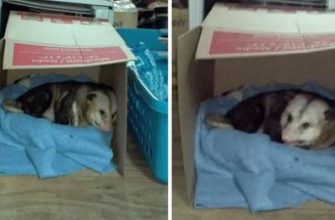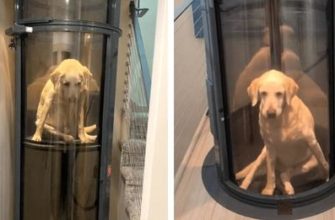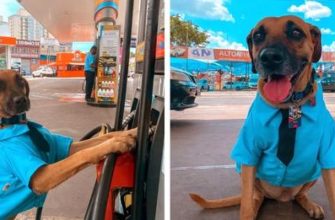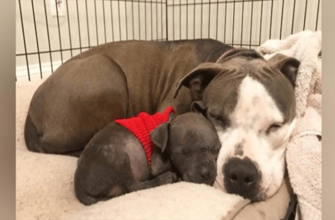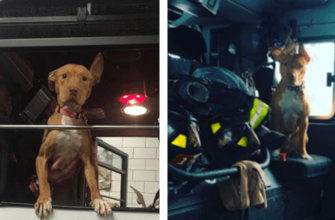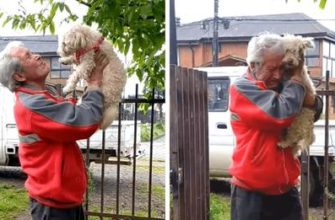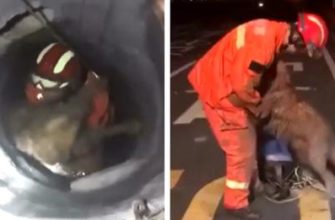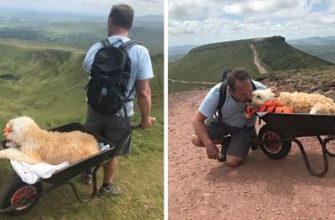Steve was dealing with loneliness and the lingering effects of multiple combat deployments after retiring from the Army. The veteran’s new best friend is a blind and deaf dog who spent nearly 200 days in Texas shelters before finding his home.
Steve grew up in Wisconsin and enlisted in the Army National Guard in 1985. As the son of a Korean War veteran, he knew early on that he wanted to serve his country.
“I think it was always my calling. When he was a kid, he played army all the time. It was something I always wanted to do,” he says.
Guardsmen often hold civilian jobs or attend college while maintaining their part-time military training. While that balance between military and civilian life is an asset that appeals to many, Steve found it unsatisfying.
“I didn’t get what I thought. I wanted something more»
In 1997, Steve made the military his job full time. He enlisted in active duty in the Army and served ten years as a heavy anti-armor infantryman. Soldiers in this military occupational specialty (MOS) are responsible for assaulting and destroying enemy tanks, armored vehicles, emplacements, and weapons.
Steve enjoyed his work and appreciated the ties he established with his brothers in arms.
“I’ve been all over the world with that job, and there’s nothing like brotherhood in an infantry squad,” he says. «You are always looking out for each other.»
The job of an infantryman involves great risk, especially in times of conflict. Steve deployed to the Middle East in support of Operation Iraqi Freedom (OIF) in 2003. While there, he sustained injuries from an improvised explosive device blast.
To this day, the combat veteran is dealing with traumatic brain injury (TBI) and post-traumatic stress disorder (PTSD). These invisible wounds of war can have long-term effects on memory, mood, and the ability to concentrate. Other symptoms can be headaches, vision and hearing problems.

Ironically, it was a non-service-connected injury that would end up turning the tide of the soldier’s career.
Steve was posted to Germany following his 15-month deployment to Iraq. He liked to explore the country on his mountain bike when he wasn’t working. On a dangerous outing he crashed and was thrown from his bike, causing significant wrist damage.
The injury left Steve unable to properly perform his infantry duties. He completed the reclassification process and changed his MOS to military intelligence (MI).
The soldier was reluctant to abandon his infantry squad, but he had no other choice. To his surprise, the job transition turned out to be more rewarding than he initially expected.
“My time in the infantry helped me a lot to advance my military intelligence career,” he says. “He helped me understand what the ground commanders wanted and needed in intelligence.”
Steve continued to serve in foreign operations after transferring to the intelligence field. He would end up completing two more combat deployments. But it was a unique peacekeeping mission that he remembers most fondly.
“I worked in the Sinai Peninsula with the Multinational Force and the Observers. We were there to enforce the 1979 peace treaty between Egypt and Israel,” he recalls. “We were making sure there were no treaty violations between the two countries.”
As Steve’s IM career thrived, so did his life on the home front. The soldier got married, and eventually he and his wife decided to start a family. In 2011, the couple completed the necessary paperwork and training to become licensed foster parents.
Shortly thereafter, Steve deployed to the Middle East for six months. The parents-to-be were assigned a set of siblings much sooner than they had anticipated.
“My wife got the call while I was in Afghanistan. She began to welcome them and, in fact, I did not meet them until I returned home, ”she explains.
At the time, Nathan and Cole were two years old and one year old, respectively. Nathan suffers from Coats’ disease — a rare disorder of the retina — and has been blind in his left eye since his birth.

In addition, both biological brothers had been diagnosed with autism spectrum disorder (ASD). Children with ASD do not look different from their peers, but they often behave, communicate, interact, and learn differently.
Steve lives with the lingering — and invisible — effects of TBI and PTSD, and relates to the special needs of his children.
The couple officially adopted the children two years later. Little did they know that a blind and deaf dog would soon join their special family.
Steve retired in January 2020 after 13 years in the National Guard and 23 years of active duty. He traveled the world during a career that spanned four decades. In the end, he settled in central Texas, an hour away from his children and his now-ex-wife.
For many veterans, the transition from military to civilian life is a difficult time. Steve missed the camaraderie he shared with his teammates. And his children live too far away to spend time with them every day.
The onset of the COVID-19 pandemic further compounded the new retiree’s sense of isolation.
“When I left the army, it was a lot of work for me,” Steve recalls. “I needed someone to hang out with, to do something with.”
The veteran thought of the many ways a companion pet can help alleviate loneliness. Steve grew up with animals and adopted several cats and dogs when he was married.

More importantly though, Steve wanted to honor a pact he made with Nathan and Cole, who are now 11 and 10 years old, respectively.
“I promised the boys that one day I would have a dog, one that they could keep in my house so that there would be something too when they came to see me.”
PATIENCE IS A VIRTUE
Steve started looking for a four-legged friend online and eventually visited a shelter near Steve’s house. Although he did not find the “chosen one” that day, he did pick up a Mascots for Patriots pamphlet.
The former intelligence analyst went online to learn about our mission and our work. He was impressed by the many benefits our program offers both veterans and shelter pets.
“There are a lot of organizations that I think you should be wary of,” he says, “but I realized this wasn’t one of them.”
Steve was willing to take his time, though he admits to being disappointed that he didn’t find the right dog right away. The retired combat veteran knew it was especially important to find a dog that would get along with his two children.
“It can take a while to find the perfect dog or cat. You have to take your time because it is not something you want to do in a hurry”
Meanwhile, Steve found something else to keep him busy while he searched for a furry companion: a job.

REWARD IS A BLESSING
Steve currently works as a contractor training military intelligence analysts in the use of MI computer systems. He likes working with soldiers again, and the job reaffirms something he learned years ago.
“It took me a long time to figure out what my passion was, but eventually I figured out why I was in the military,” he says. “My passion is helping soldiers: taking care of them, training them and guiding them”
Steve now sees that guiding others over the years has been unexpectedly rewarding.
“The greatest reward is that even though I am already retired, there are still soldiers who seek me out and ask my advice. They ask me how I’m doing. Some call me and tell me that I was very hard on them and now they know they needed it, and they thank me.»
Going back to work helped Steve establish a new battle rhythm. He added much-needed structure and social interaction to his days and reignited his passion for working with soldiers.
But the Army veteran kept coming home at the end of the day a lonely man.
«My gosh, this dog would be a perfect fit for us.»
Steve regularly checked the web pages of local shelters until one particular photo and profile stopped him. He remembers that day very well, because it happened to be Veterans Day.
Ernie was born on a ranch, deaf and nearly blind. The rancher turned him over to a shelter, fearing that he would not be able to provide a pup with such difficulties a safe environment.
“I read about his special needs and thought, ‘Wow, this dog would be a perfect fit for us.’ My kids have special needs. I am slightly deaf and blind and have special needs. I really wanted to meet him»
At the time, the 1-year-old sheepdog mix was in the care of Texas Humane Heroes, where he had been transferred after spending months at another Texas shelter.
Since 2013 Texas Humane Heroes has offered veterans of our program half-price adoptions through the Leander and Killeen shelter locations.
Steve spent time with Ernie at the shelter. They went for walks and played together. The search was over.
The retired combat veteran learned that Ernie spent nearly 200 days homeless — most of his young life — between Texas Humane Heroes and the previous shelter from which he was transferred.
«He was very skittish and was slow to warm up,» he recalls. «But I knew we were a good fit.»

A blind and deaf dog is the perfect battle partner
Steve took it upon himself to foster the special needs pup while he enrolled in our program. Once home together, the first thing the veteran did was change the name of his new partner.
“I thought that with my military experience and the rank that I had, the most appropriate thing was to have a private, someone that I could command,” he jokes.
Steve and Private were officially adopted in December 2020. By then, Private had fully adjusted to his new living space, and the couple found an innovative way to communicate.
“If I need to get his attention, I snap my fingers and that usually works,” says Steve. «Or if it’s near something you can tap on, it will respond to the vibration.»
Private also has a clever way of getting Steve’s attention.
“He loves to be petted. The sweet spot on him is just below the chin, where the muzzle meets the neck. He loves to be petted there,” says the veteran. “If I stop caressing him, he gives me a paw so that I continue caressing him. It’s as if he were saying, «How dare you stop doing it?»
Private has other charming habits. He likes to find Steve’s shoes and throw them into the air. In the middle of the night he gets up to play. He does well on walks, negotiating fallen trees and logs with ease. And then there is the door.
“For a vision-impaired dog, he really likes to look out the door,” says Steve.
However, it seems to Private that what he likes the most is to go in the car. So much so that Steve has to walk on Private’s right side to prevent him from making a beeline for the car every time they leave the house.
«He’s obsessed with riding in the car with me,» he says. “
Steve enjoys the quirks of his battle partner and wouldn’t change it at all. That the soldier is blind and deaf makes him even more perfect.
«The soldier is my partner,» he says. «He is my partner»
Steve introduced Nathan and Cole to Private slowly. The dog took a while to warm up, but the trio get along well.
“They know that he has special needs just like they do. They have a special bond in that sense,” he explains. “They know where to pet him and not get too close to him. They are very good with him and he is very good with them.»

The Army veteran recently returned to Texas Humane Heroes with his sons and the soldier. Before, they purchased pet necessities and toys to donate to the shelter. It was a fun day for everyone, including his blind and deaf dog.
“Private is like a rock star there. The staff adored him when he was there and were so excited to see him again,” says Steve. “Everyone took pictures of him and sent them to his friends who weren’t working that day. The guys thought they were in the company of a bona fide rock star because of the attention Private was getting.»
For Steve, Private is more than a rock star; the special needs pup is the rock of it. The veteran, once alone, now enjoys the special camaraderie a shelter dog can provide.
«It’s a joy and a consolation to be with him,» says the retiree. «He has given me that bit of company that I was missing.»
Steve dedicated much of his life to the service of our nation. He has endured multiple combat missions and is dealing with the lingering effects of TBI and PTSD. But his most important achievement is being a devoted father of two young children who, thanks to him, have a very special canine brother.

It seems fitting that Steve adopted a blind and deaf dog. He must be a person with compassion, patience and a very loving heart to choose a pet with problems for life. And Private knows it.
“He’s a little attention getter,” he says.
Steve encourages other veterans who feel lonely to consider adopting a pet. But if adoption isn’t an option, simply spending time in a shelter has great benefits, too.
“Go to a shelter and visit the dogs or cats. It’s a great way to relieve stress and anxiety, and you walk out of there feeling happy,” he says, adding, “I would never have a dog that wasn’t from a shelter.”
He shares the story to raise awareness and also requests Pets for Patriots when you’re ready to adopt.

